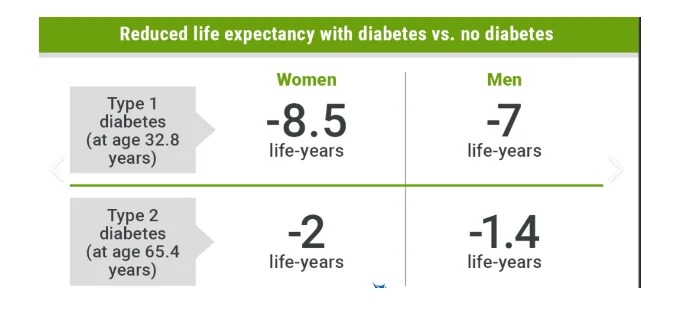Diabetes Management Policies in England
Introduction
In modern healthcare, diabetes becomes a major health concern worldwide that poses adverse impacts on people’s social, physical, emotional and economic wellbeing (Ahmad et al. 2019). This report aims to discuss policy taken by the government in effective management of diabetes in England in relation to variation in ethnicity and gender. The National Service Framework (NSF) for diabetes sets standards for effective treatment and management of diabetes in England [NHS, 2018]. National Service Framework for Diabetes: standards include the key interventions, analysis and rationale of implications of the planning services. The NSF for diabetes includes the 'Action for Diabetes' that is associated with taking relevant tools and techniques in terms of improving the quality of care delivery to diabetic patients in England. This report will define diabetes and then discuss the numbers of people who are affected by this chronic illness. This report will also discuss the impacts of this chronic illness on the physical and emotional wellbeing of people in England.
Definition:
The World Health Organization [WHO] has defined diabetes as a chronic health condition that interferes with people’s activities of daily living thereby reducing their quality of living [WHO, 2010]. NHS (2018) mentioned that England is reported to have a high number of diabetes cases in which people of all; age group are affected by this chronic health condition [NHS, 2018]. Although diabetes is a chronic health condition that cannot be prevented permanently, through following the systematic medication regime and effective lifestyle behaviour, people can manage this health condition (Barron et al. 2020). Although the exact cause of diabetes is still obscure, evidence suggests that many causative factors are associated with increased chances of diabetes in people. These factors are:
Obesity Regular smoking and drinking Irregular and sedentary lifestyle Unhealthy eating with more intake of trans and saturated fats and less protein Lack of physical activities or exercises.

PHE (2018) mentioned that people with diabetes are vulnerable to the risk of different additional health issues such as:
Cardiovascular disease (CVD) Coronary heart disease (Curtis et al. 2018) Angina and myocardial infarction Peripheral vascular disease Venous and arterial leg ulcer due to reducing blood supply to the leg (Holman et al. 2020) Urinary tract infection (Kerr, 2020) Soft tissues condition such as frozen shoulder Mental health issues such as anxiety, depression and loneliness.
Pathophysiology of diabetes mentions that there are two types of diabetes as type 1 and type 2. In the case of people with type 2 diabetes, insulin-secreting beta cells of the pancreas are destroyed due to an autoimmune response which leads to a lack of insulin in the bloodstream which raises the blood sugar level (Kerr et al. 2019). On the other hand, in type 1 diabetes, there is a lower secretion of insulin from beta cells than the normal condition. Additionally, in the case of type 1 diabetes, there develops an insulin resistance system inside the body that reduces the ability of the body to utilize sufficient insulin thereby increasing the blood sugar level.
Take a deeper dive into Implications For Diabetes Management with our additional resources.
Numbers of people with diabetes:
In Global Burden of Disease (GBD) 2016, diabetes ranks as the 12th highest specific cause of morbidity and mortality worldwide. PHE (2018) mentioned that prevalence of diabetes increases in England by 20 times that poses adverse impacts on the health and wellbeing of the citizen. The report also shows that from 1995 to 2017 the prevalence of doctor-diagnosed diabetes increases from 2.4% to 6.9% [PHE, 2018]. Recent studies have shown that in 2018 more than 24% of people suffer from undiagnosed diabetes in England.

During 2017, more than 3.9 million people age 16 and below are diagnosed with type 2 diabetes. Out of these percentage, the majority suffer from obesity and overweight. As mentioned by Leelarathna et al. (2020), obesity and overweight increase the vulnerability of people to the risk of diabetes. The PHE (2018) mentioned that in England diabetes is strongly associated with ethnicity such as the prevalence of diabetes is higher in the black ethnic community (15.4%) and South Asian community (15%) as compared to people belonging to the whitish UK-borne community (8%) [PHE, 2018].

PHE (2016) mentioned that, if the age, ethnicity and gender remain constant then the numbers of diabetic people in England will increase from 3.5 million in 2017 to 4.4 million in 2025 [PHE, 2018]. The WHO (2018) predicts that more than 4.9 million people in England will suffer from diabetes in 2035. Gender is strongly associated with the development of diabetes. PHE (2018) mentioned that men are more likely to suffer from diabetes than women. The report shows that as compared to 9.6% of men, 7.6% of women in England are diagnosed with diabetes [PHE, 2018]. A recent report shows that ethnicity poses potential impacts on gender-related diabetes in England. For example, it is estimated that the numbers of men (15%) who are infected in the black ethnic and South Asia community of England are twice than the diabetic men (8%) belonging to the whitish and UK borne communities [WHO, 2018].

Diabetes UK (2018) mentioned that middle-aged men (35-54) are twice more vulnerable to the risk of diabetes as compared to their women peers. The above graphical presentations also show that in Egland men belonging to the age group 50-59 have twice the risk of developing diabetes than their women counterparts (Diabetes UK, 2018). PHE (2018) mentioned that more than 2.6% of men of age group 35-44 years have a higher vulnerability to diabetes as compared to 1.2% of women belonging to the same age group [PHE, 2018]. Evidence also suggests that more than 6% of men belonging to the age group 45-54 are vulnerable to the risk of diabetes as compared to the 3.6% of the women peers [Diabetes UK, 2018].

PHE (2018) mentioned in its report that in England, life expectancy decreases with age and gender due to the prevalence of diabetes. The report shows that, in the case of women and men of the average age of 32.8 years, the life expectancy rate reduces by 8.5 and 7 life years due to the presence of diabetes respectively [Diabetes UK, 2018]. On the other hand, at an average age of 65.4 years, the life expectancy is reduced by 2 years and 1.4 years in diabetic men and women respectively [PHE, 2018].

Summary of the governmental policies:
PHE (2018), mentioned the NSF for diabetes aims to set the necessary standard for the care providers to adhere to all the guidelines under this framework in terms of providing compassionate and high-quality care to diabetic patients in England [PHE, 2018] Under NSF for diabetes sets 12 standards that the care providers in England need to follow and implement in their care delivery to ensure that appropriate holistic care provided to services uses to manage their health condition. These standards are as follows:
Standard 1: prevention of the type 2 diabetes Standard 2: effective identification as well as assessment of diabetes Standard 3: empowerment of people with diabetes Standard 4: effective clinical care of adults with diabetes Standard 5& 6: clinical care for young people and children with diabetes Standard 7: effective management tackling of diabetes Standard 8: compassionate care delivery to patients with diabetes in hospital Standard 9: pregnancy and diabetes Standard 10 11 & 12: proper detection as well as effective management of diabetes.
Aims of governmental policies:
Aim of policies set by the UK government is to provide the high standard care and effective treatment to the service users who suffers from diabetes to improve their quality of living (Penn et al. 2018). Additionally, this policies and practices against diabetes aim to reinforces effective self-management skill on diabetes patients by providing them with proper health information regarding diabetes that can improvs their ability to control own health and wellbeing.
What have been done by government to prevent diabetes
NHS Diabetes Prevention Program (NHS DPP):
NHS Diabetes Prevention Program (NHS DPP) is developed by the Public Health England (PHE), NHS (National Health Service), England and the Diabetes UK. Recent reformation in this program has been conducted in this 2017 (Palladino et al. 2020). This program aims to provide the high-quality care and treatment to people suffering from diabetes. Under this program people are provided with proper health information regarding what the diabetes is, how this health condition develops and what are its health implications. Under this NHS Diabetes Prevention Program (NHS DPP), Health Service Executives (HSE) administer that whether health and social care staffs and community nurses perform weekly glucose monitoring, cholesterol test and complete blood count test of service users (NHS, 2019). In addition to this, under this program pregnant women and aged people are provided with proper health education that can improve their self-management skill which can help them to have good control over their own health and well-being. Under this initiative UK government emphasizes on empowering people with diabetes by ensuring the health and social care providers will take the holistic approach that can meet holistic needs of diabetic people thereby improving their livelihood.
Action for Diabetes, NHS:
Under this initiative, UK government provides training and professional developmental opportunities to all the health ad social care staffs to enhance their skill in managing the health needs of diabetic patients (NICE, 2019). Under this program, health and social care staffs and HSE would promote positive lifestyle behaviors and healthy habits in people which will enable them to reduces the chances of diabetes or enhances the ability to manage the symptoms of diabetes in the diabetic patient.
Health matters: preventing Type 2 diabetes:
Under NMC (2018), nursing professionals must respect the autonomy, and rights of service users who suffers from diabetes (NMC, 2018). NICE (2018) developed clinical guidelines and principles for the health and social care providers who assist the diabetic people to get the high-quality clinical care and effective treatment at the hospital or home setting. Under this initiative, health and social care professionals will not only monitory the glucose level, cholesterol and the blood counts of diabetes patients but also will encourage them to undertake the regular psychotherapies that will improves the cognitive skill in patients.
Strengths of NSF for diabetes:
Increasing public awareness regarding the signs, symptoms, cause and management of diabetes thereby assisting care professionals, the community and the general public to conduct earlier identification of diabetes (Palladino et al. 2020). Following the set of standards and principles under the NSF in terms of effective assessment of diabetes and its associated risk factors. Taking holistic as well as person-centred approach for people for meting physical, emotional, psychological and social needs of diabetic patients (Penn et al. 2018). Conducting follow up and regular physical assessment of people to detect how many people are at higher risk of developing diabetes due to having impaired insulin function (Barron et al. 2020). Screening the major risk factors that are associated with diabetes such as obesity, smoking, smoking and sedentary lifestyle and
Implications of NSF for services planning:
NHS along with the local statutory health and social care agencies develop the local plan that will provide the necessary services, clinical support and health education to people with diabetes and undiagnosed diabetes to reduce the prevalence of diabetes in England (Strain et al. 2018). Staffs and the care providers who are included in this service plan are: Community care staffs and primary health and social care staffs who work with people in the black ethnic and south Asian county in England.
Direct staffs of NHS Nursing home and residential care staffs (Barron et al. 2020) Specialist cardiology and renal team staffs Pharmacist, diabetologists, physiotherapist, occupational therapists and surgeon.

Weakness of the policy:
Only one weakness of NSF for diabetes is the poor implementation of the standard and principles of this policy in many regions of England which make many people, especially the people residing in the ethnic community lack the proper clinical support (Zhong et al. 2018). The reason behind the poor policy implementation is the lack of resources in the NHS hospitals in the interior regions of England, such as lack of find, skilled care staffs and modern technologies which make NHS officials unable to conduct effective assessment and detection of diabetes.
Conclusion:
From the above-mentioned discussion, it can be concluded that diabetes is a chronic illness that occurs due to lack of or insufficient insulin production from beta cells of the pancreas. There are two types of diabetes such as type 1 and type 2 diabetes. In type 1 diabetes, blood sugar increases because of the insulin resistance system inside the body that reduces the production of insulin. On the other hand, in type 2 diabetes beta cells are destroyed by the body's immune system thereby causing a lack of insulin in the circulation that increases the blood sugar level. In England, there is an ever-increasing number of diabetes which is associated with additional health issues in people such as CVD, arterial disease, heart stroke and venous leg ulcer. From the overall discussion, it can be recommended that the UK government must focus on improving the socio-economic condition of people residing in the minority ethnic and deprived communities by developing employment, affordable housing and social support for them that will improve their quality of living. Through elevating the standard of living it is possible to reduce the prevalence of diabetes in people in England.
Reference list:
- Ahmad, N., Adderley, U., Ionac, M. and Bowling, F.L., 2019. The epidemiology of amputation inequality extends beyond diabetes in England. The international journal of lower extremity wounds, 18(2), pp.112-113.
- Barron, E., Clark, R., Hewings, R., Smith, J. and Valabhji, J., 2018. Progress of the Healthier You: NHS Diabetes Prevention Programme: referrals, uptake and participant characteristics. Diabetic Medicine, 35(4), pp.513-518.
- Holman, N., Knighton, P., Kar, P., O’Keefe, J., Curley, M., Weaver, A., Barron, E., Bakhai, C., Khunti, K., Wareham, N.J. and Sattar, N., 2020. Type 1 and type 2 diabetes and COVID-19 related mortality in England: a cohort study in people with diabetes.
- Kerr, M., Barron, E., Chadwick, P., Evans, T., Kong, W.M., Rayman, G., Sutton‐Smith, M., Todd, G., Young, B. and Jeffcoate, W.J., 2019. The cost of diabetic foot ulcers and amputations to the National Health Service in England. Diabetic Medicine, 36(8), pp.995-1002.
- Khanolkar, A.R., Amin, R., Taylor‐Robinson, D., Viner, R.M., Warner, J. and Stephenson, T., 2019. Inequalities in glycemic control in childhood onset type 2 diabetes in England and Wales—A national population‐based longitudinal study. Pediatric diabetes, 20(7), pp.821-831.
- Mackin, S.T., Nelson, S.M., Kerssens, J.J., Wood, R., Wild, S., Colhoun, H.M., Leese, G.P., Philip, S. and Lindsay, R.S., 2018. Diabetes and pregnancy: national trends over a 15 year period. Diabetologia, 61(5), pp.1081-1088.
- Paisey, R.B., Abbott, A., Levenson, R., Harrington, A., Browne, D., Moore, J., Bamford, M., Roe, M. and South‐West Cardiovascular Strategic Clinical Network peer diabetic foot service review team, 2018. Diabetes‐related major lower limb amputation incidence is strongly related to diabetic foot service provision and improves with enhancement of services: peer review of the South‐West of England. Diabetic Medicine, 35(1), pp.53-62.
- Penn, L., Rodrigues, A., Haste, A., Marques, M.M., Budig, K., Sainsbury, K., Bell, R., Araújo-Soares, V., White, M., Summerbell, C. and Goyder, E., 2018. NHS Diabetes Prevention Programme in England: formative evaluation of the programme in early phase implementation. BMJ open, 8(2).
- Strain, W.D., Hope, S.V., Green, A., Kar, P., Valabhji, J. and Sinclair, A.J., 2018. Type 2 diabetes mellitus in older people: a brief statement of key principles of modern day management including the assessment of frailty. A national collaborative stakeholder initiative. Diabetic Medicine, 35(7), pp.838-845.
- Zhong, V.W., Juhaeri, J. and Mayer-Davis, E.J., 2018. Trends in hospital admission for diabetic ketoacidosis in adults with type 1 and type 2 diabetes in England, 1998–2013: a retrospective cohort study. Diabetes Care, 41(9), pp.1870-1877.
- 24/7 Customer Support
- 100% Customer Satisfaction
- No Privacy Violation
- Quick Services
- Subject Experts



